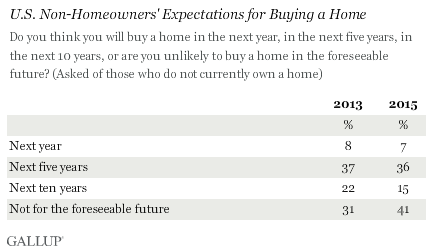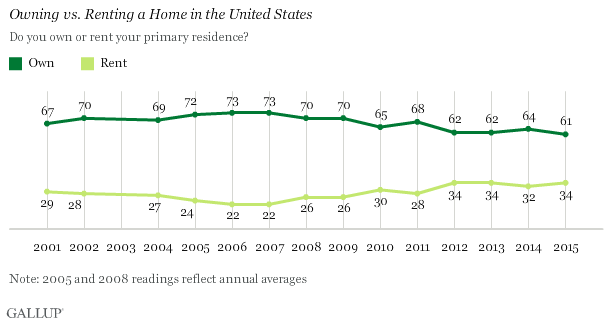More Americans who do not currently own a home say they do not think they will buy a home in "the foreseeable future," 41%, vs. 31% two years ago. Non-homeowners' expectations of buying a house in the next year or five years have stayed essentially the same, suggesting little change in the short-term housing market. As a result, what may have been a longer-term goal for many may now not be a goal at all, and this could have an effect on the longer-term housing market.

One of the long-running facets of the "American Dream" has been the ability to buy a house. Yet seven years after the housing market crashed in 2007-2008, it appears that a renewal of zeal for home buying may not yet be evident in the United States. Two years ago, Gallup asked those who did not own a home in the U.S. whether they thought they would buy a house in various time periods in the future. The current Gallup poll shows little movement in Americans' opinions since 2013, except in the sentiment that those who do not own a home say they won't buy one in the foreseeable future. These results come in the same poll that finds a drop in the percentage of all Americans who say it is a good time to buy a house.
Homeownership Rate Lowest in 15 Years
As non-homeowners' expectations for buying a home in the foreseeable future have waned, homeownership rates have also declined from last year. In the April survey, 61% of Americans say they own their primary residence, 34% say they rent, and the remaining 5% have other living arrangements, mostly living with their parents.
That percentage of homeownership is the lowest Gallup has measured in its 15-year trend. The highest percentage of Americans who said they own their home was 74% in a poll in 2005, when the homeownership boom of the 2000s was cresting.
The percentage of renters is tied for the high since Gallup began asking this question in 2001. The low point for renting occurred in 2006 and 2007 at 22%, just before the U.S. plunged into the Great Recession. Since then, renting has become the norm for about a third of the nation's adults. The U.S. Census bureau keeps track of homeownership in its surveys. The bureau's most recent estimate of home ownership was 64% in the fourth quarter of 2014, roughly matching Gallup's finding.
Bottom Line
It has been a closely held belief for many in the U.S. that owning a home is a key to eventual personal prosperity. But the Great Recession of 2007-2009 may have changed Americans' ability to act on that belief, given that the housing market has yet to return to pre-recession levels of ownership or home values. It is possible that homeownership will return to previous levels in the years ahead if the economy continues to improve; it is also possible that a "new normal" is occurring in this country, wherein Americans won't be buying a house for the foreseeable future.
For a younger generation that is struggling with student debt, renting a home may be an increasingly safe option. Whatever the reasons, non-homeowners' expectations for buying a home in the near future appear to be waning, and the percentage who say they own their own home is the lowest in nearly 15 years. For an economy that could benefit from a housing recovery for sustained growth this decade, this news may not be the most welcome.
Survey Methods
Results for this Gallup poll are based on telephone interviews conducted April 9-12, 2015, with a random sample of 1,015 adults, aged 18 and older, living in all 50 U.S. states and the District of Columbia. For results based on the total sample of national adults, the margin of sampling error is ±4 percentage points at the 95% confidence level. For results based on the total sample of 324 non-homeowners, the margin of sampling error is ±7 percentage points at the 95% confidence level.
Each sample of national adults includes a minimum quota of 50% cellphone respondents and 50% landline respondents, with additional minimum quotas by time zone within region. Landline and cellular telephone numbers are selected using random-digit-dial methods.
Courtesy of Gallup



Comments